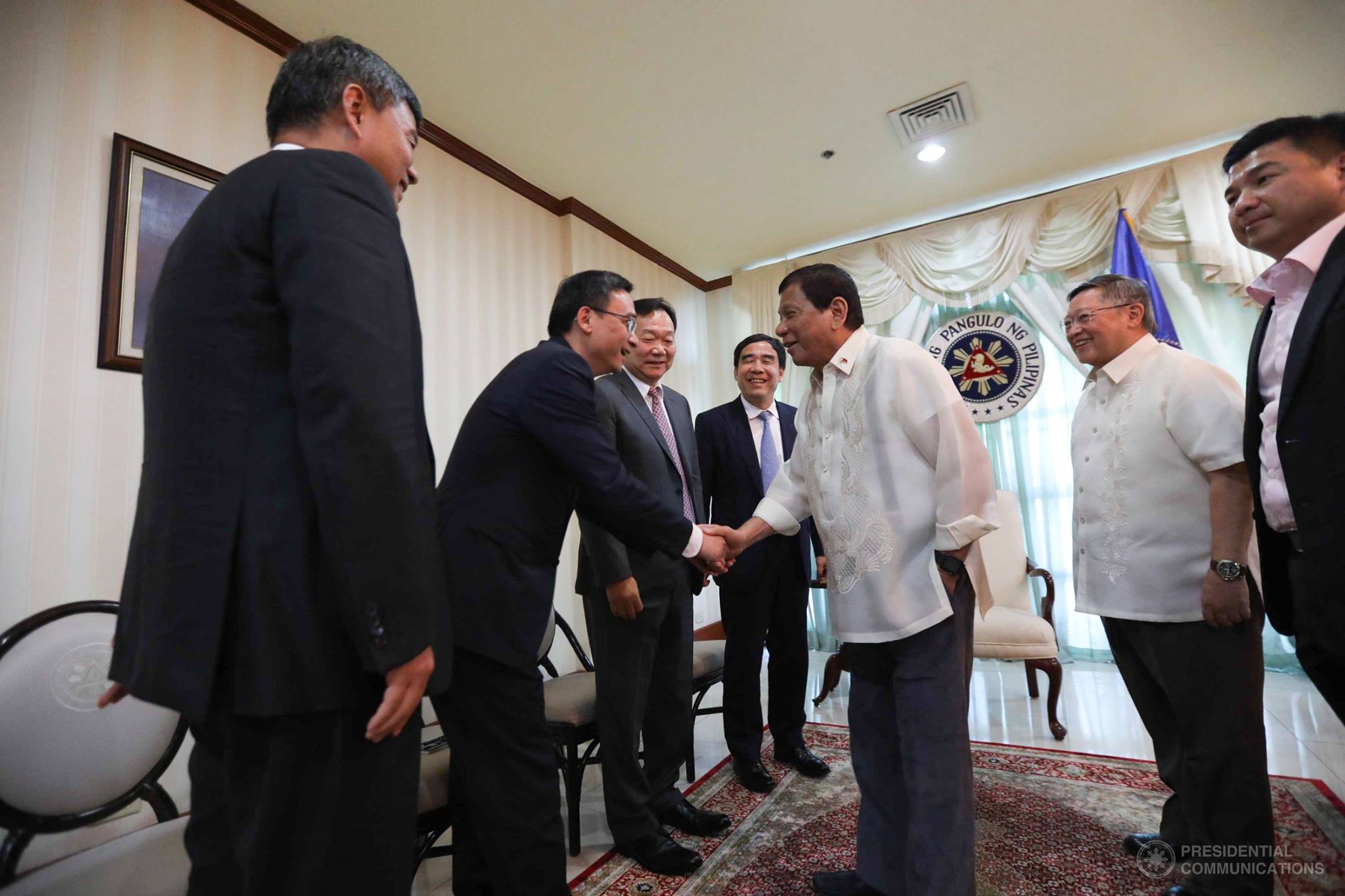Six months after Rodrigo Duterte brought home $24 billion in pledges from China, the Philippines seems to be speeding up the implementation of the 13 bilateral agreements signed during his state visit, as these will aid the administration’s goal for the country to enter into a golden age of infrastructure.

Philippine President Rodrigo Duterte met with the top executives from Bank of China on April 8, 2017.
Even during his candidacy for president, Duterte had been clear on his preference for friendly relations with China. In one gathering where he was invited to speak, he vowed to ask the country to help the Philippines build railways and set aside differences for the meantime. Indeed, once he was seated in office, the two neighboring states reopened bilateral talks—commencing with Duterte’s state visit in October last year. High-level meetings followed the visit to iron out implementation details of the agreements.
Two Chinese officials visited in March: the new Minister of Commerce Zhong Shan, who witnessed the resumption of the Joint Committee on Trade and Economic Cooperation which had been in hiatus since 2011; and Vice Premier Wang Yang who flew to Davao to see possible locations of investment projects.
In recent months, priority projects have been identified. The mode of financing of some projects was also revised from private-public partnership to official development assistance. The Chico River Pump Irrigation, the south line of the North-South Railway, and the New Centennial Water Source-Kaliwa dam project in Quezon province, which are expected to be finalized within the year, will be provided financial assistance by the Export-Import Bank of China.
According to officials of the National Economic and Development Authority, the shift to ODA allows the government to deliver projects sooner as bilateral arrangements need no time-consuming bidding process as required for PPP procurement. It also gives them favorable terms for long-term soft loans with up to 30 years repayment period. Nonetheless, the government is also considering a hybrid PPP scheme, whereby they can construct the project through ODA and tap the private sector to bid for operation and maintenance.
Striking while the iron is hot, the Philippine economic team appears to be fast-tracking the delivery of projects, while relations between Manila and Beijing continue to be favorable for trade, investment, and development cooperation.
Momentum also favors China, whose investors have opted to do business despite some remaining concerns regarding taxes, foreign land ownership and equity restrictions, and high energy cost in the Philippines. The Chinese government would also want to accomplish projects as early as possible while the relations between the two countries are amicable. One indication was a statement by Ambassador Zhao Jianhua of his support for giving the president emergency powers to ensure that infrastructure projects are not delayed beyond Duterte’s term. Chinese scholars likewise worry that once his term ends in six years, the new administration might not be as friendly to Beijing as the present one.
It may be to the Philippines’ advantage to finish the projects before 2022, whether the reason is to beat deadlines, to sustain growth momentum, or to avoid the fallout of policy inconsistencies that tend to accompany changes in Philippine administration. However, fast-tracking projects, for example by doing away with bidding required of PPP projects, might lead to laxity in implementation of due diligence procedures; consequently, projects may suffer from inferior quality of outputs or unnecessary costs.
Despite hastening the pace of implementation, government has the duty to make sure that projects meet the technical standards, that bidders are well-examined, and that government itself does not become a source of corruption.
Already, there have been some kinks in the implementation. Just after the signing of agreements in October, a Chinese firm banned by World Bank and another firm reportedly used by Beijing for reclamation in the disputed Spratly Islands, were among the companies that bagged projects in the Philippines. The China Road and Bridge Corporation (CRBC) is supposed to partner with the Bases Conversion and Development Authority (BCDA) to develop the Bonifacio Global City-Ninoy Aquino International Airport portion of the capital’s Bus Rapid Transit project. The BCDA immediately clarified that only a Memorandum of Understanding to conduct feasibility studies had been signed with the CRBC.
Second, rather than be overwhelmed by the potentially massive fund infusions by the Chinese government, the Philippines must learn from past aid and investment scandals (NBN-ZTE; Northrail, etc.) during the Arroyo administration. This does not mean a need to be cynical about cooperation with Beijing, rather we should ensure that measures are set in place to avoid what happened a decade ago.
In November, the NEDA-Investment Coordination Committee was designated as the point agency in facilitating investment dealings with China. The NEDA Board then approved the “Guidelines on Availment of Chinese Support for the Conduct of Pre-investments and Investment Activities”. It is hoped that the guidelines serve to screen out unscrupulous deals. However they should not end up only as a reminder to Philippine officials of the need for transparency. Other check-and-balance mechanisms, frequent monitoring, and perhaps working together with private sector institutions will allow the cooperation to better ‘stand the test of time’.
Further, Manila should study as well the experiences of countries that have had similar dealings with Beijing.
It is a challenge for the current government to embrace the opportunities while at the same time avoid anomalies that may arise from transactions with Chinese companies and state enterprises. The current situation gives both governments a chance to do things right this time around. More importantly, the Duterte administration must prove to the public that dealing with the Chinese should not necessarily be under a cloud of doubt; rather, it should make certain that its own house is well-equipped for challenges that are bound to come along with new business deals.
